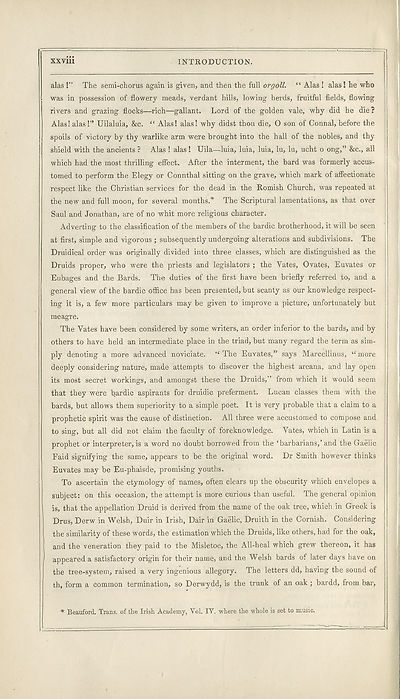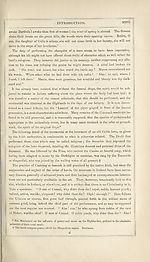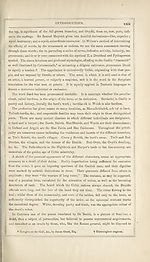Books and other items printed in Gaelic from 1871 to 1900 > Sar-obair nam bard Gaelach, or, The beauties of Gaelic poetry, and lives of the Highland bards
(40) Page xxviii
Download files
Complete book:
Individual page:
Thumbnail gallery: Grid view | List view

INTRODUCTION.
xxviii
alas !” The semi-chorus again is given, and then the full orgoll. “ Alas! alas! he who
was in possession of flowery meads, verdant hills, lowing herds, fruitful fields, flowing
rivers and grazing flocks—rich—gallant. Lord of the golden vale, why did he die?
Alas! alas!” Uilaluia, &c. “ Alas! alas! why didst thou die, O son of Connal, before the
spoils of victory by thy warlike arm were brought into the hall of the nobles, and thy
shield with the ancients ? Alas ! alas 1 Uila—luia, luia, luia, lu, lu, ucht o ong,” &c., all
which had the most thrilling effect. After the interment, the bard was formerly accus¬
tomed to perform the Elegy or Connthal sitting on the grave, which mark of affectionate
respect like the Christian services for the dead in the Romish Church, was repeated at
the new and full moon, for several months.* The Scriptural lamentations, as that over
Saul and Jonathan, are of no whit more religious character.
Adverting to the classification of the members of the bardic brotherhood, it will be seen
at first, simple and vigorous ; subsequently undergoing alterations and subdivisions. The
Druidical order was originally divided into three classes, which are distinguished as the
Druids proper, wrho were the priests and legislators ; the Vates, Ovates, Euvates or
Eubages and the Bards. The duties of the first have been briefly referred to, and a
general view of the bardic office has been presented, but scanty as our knowledge respect¬
ing it is, a few more particulars may be given to improve a picture, unfortunately but
meagre.
The Vates have been considered by some writers, an order inferior to the bards, and by
others to have held an intermediate place in the triad, but many regard the term as sim¬
ply denoting a more advanced noviciate. “ The Euvates,” says Marcellinus, “ more
deeply considering nature, made attempts to discover the highest arcana, and lay open
its most secret workings, and amongst these the Druids,” from which it would seem
that they were b.ardic aspirants for druidic preferment. Lucan classes them with the
bards, but allows them superiority to a simple poet. It is very probable that a claim to a
prophetic spirit was the cause of distinction. All three were accustomed to compose and
to sing, but all did not claim the faculty of foreknowledge. Vates, which in Latin is a
prophet or interpreter's a word no doubt borrowed from the ‘barbarians,’and the Gaelic
Raid signifying the same, appears to be the original word. Dr Smith however thinks
Euvates may be Eu-phaisde, promising youths.
To ascertain the etymology of names, often clears up the obscurity which envelopes a
subject: on this occasion, the attempt is more curious than useful. The general opinion
is, that the appellation Druid is derived from the name of the oak tree, which in Greek is
Drus, Derw in Welsh, Duir in Irish, Dair in Gaelic, Druith in the Cornish. Considering
the similarity of these words, the estimation which the Druids, like others, had for the oak,
and the veneration they paid to the Misletoe, the All-heal which grew thereon, it has
appeared a satisfactory origin for their name, and the Welsh bards of later days have on
the tree-system, raised a very ingenious allegory. The letters dd, having the sound of
th, form a common termination, so Derwydd, is the trunk of an oak; hardd, from bar.
* Beauford. Trans, of the Irish Academy, Yol. IY. ■where the whole is set to music.
xxviii
alas !” The semi-chorus again is given, and then the full orgoll. “ Alas! alas! he who
was in possession of flowery meads, verdant hills, lowing herds, fruitful fields, flowing
rivers and grazing flocks—rich—gallant. Lord of the golden vale, why did he die?
Alas! alas!” Uilaluia, &c. “ Alas! alas! why didst thou die, O son of Connal, before the
spoils of victory by thy warlike arm were brought into the hall of the nobles, and thy
shield with the ancients ? Alas ! alas 1 Uila—luia, luia, luia, lu, lu, ucht o ong,” &c., all
which had the most thrilling effect. After the interment, the bard was formerly accus¬
tomed to perform the Elegy or Connthal sitting on the grave, which mark of affectionate
respect like the Christian services for the dead in the Romish Church, was repeated at
the new and full moon, for several months.* The Scriptural lamentations, as that over
Saul and Jonathan, are of no whit more religious character.
Adverting to the classification of the members of the bardic brotherhood, it will be seen
at first, simple and vigorous ; subsequently undergoing alterations and subdivisions. The
Druidical order was originally divided into three classes, which are distinguished as the
Druids proper, wrho were the priests and legislators ; the Vates, Ovates, Euvates or
Eubages and the Bards. The duties of the first have been briefly referred to, and a
general view of the bardic office has been presented, but scanty as our knowledge respect¬
ing it is, a few more particulars may be given to improve a picture, unfortunately but
meagre.
The Vates have been considered by some writers, an order inferior to the bards, and by
others to have held an intermediate place in the triad, but many regard the term as sim¬
ply denoting a more advanced noviciate. “ The Euvates,” says Marcellinus, “ more
deeply considering nature, made attempts to discover the highest arcana, and lay open
its most secret workings, and amongst these the Druids,” from which it would seem
that they were b.ardic aspirants for druidic preferment. Lucan classes them with the
bards, but allows them superiority to a simple poet. It is very probable that a claim to a
prophetic spirit was the cause of distinction. All three were accustomed to compose and
to sing, but all did not claim the faculty of foreknowledge. Vates, which in Latin is a
prophet or interpreter's a word no doubt borrowed from the ‘barbarians,’and the Gaelic
Raid signifying the same, appears to be the original word. Dr Smith however thinks
Euvates may be Eu-phaisde, promising youths.
To ascertain the etymology of names, often clears up the obscurity which envelopes a
subject: on this occasion, the attempt is more curious than useful. The general opinion
is, that the appellation Druid is derived from the name of the oak tree, which in Greek is
Drus, Derw in Welsh, Duir in Irish, Dair in Gaelic, Druith in the Cornish. Considering
the similarity of these words, the estimation which the Druids, like others, had for the oak,
and the veneration they paid to the Misletoe, the All-heal which grew thereon, it has
appeared a satisfactory origin for their name, and the Welsh bards of later days have on
the tree-system, raised a very ingenious allegory. The letters dd, having the sound of
th, form a common termination, so Derwydd, is the trunk of an oak; hardd, from bar.
* Beauford. Trans, of the Irish Academy, Yol. IY. ■where the whole is set to music.
Set display mode to:
![]() Universal Viewer |
Universal Viewer | ![]() Mirador |
Large image | Transcription
Mirador |
Large image | Transcription
Images and transcriptions on this page, including medium image downloads, may be used under the Creative Commons Attribution 4.0 International Licence unless otherwise stated. ![]()
| Permanent URL | https://digital.nls.uk/109809553 |
|---|
| Description | Out-of-copyright books printed in Gaelic between 1631 and 1900. Also some pamphlets and chapbooks. Includes poetry and songs, religious books such as catechisms and hymns, and different editions of the Bible and the Psalms. Also includes the second book ever published in Gaelic in 1631. |
|---|

